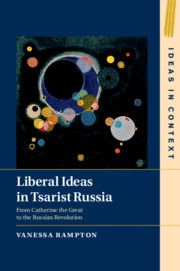Book contents
- Liberal Ideas in Tsarist Russia
- Ideas in context
- Liberal Ideas in Tsarist Russia
- Copyright page
- Contents
- Acknowledgements
- Note on Dates, Transliteration, and Other Conventions
- Introduction
- Chapter 1 Inside Out
- Chapter 2 Progress, Contested
- Chapter 3 Freedom, Differently
- Chapter 4 Liberalism Undone
- Chapter 5 Conversations with Western Ideas I
- Chapter 6 Conversations with Western Ideas II
- Conclusion
- Bibliography
- Index
- Ideas in Context
Conclusion
Published online by Cambridge University Press: 10 February 2020
- Liberal Ideas in Tsarist Russia
- Ideas in context
- Liberal Ideas in Tsarist Russia
- Copyright page
- Contents
- Acknowledgements
- Note on Dates, Transliteration, and Other Conventions
- Introduction
- Chapter 1 Inside Out
- Chapter 2 Progress, Contested
- Chapter 3 Freedom, Differently
- Chapter 4 Liberalism Undone
- Chapter 5 Conversations with Western Ideas I
- Chapter 6 Conversations with Western Ideas II
- Conclusion
- Bibliography
- Index
- Ideas in Context
Summary
This book is a comparative intellectual history of liberalism, a crucially important topic at all times but perhaps especially now when liberal values and institutions are in retreat in countries where they once seemed relatively secure, and when prospects for liberal development in countries such as Russia and China seem as remote as ever. The idea of liberalism as a persistent compromise between sometimes competing claims provides a useful interpretative paradigm for understanding the experience of Russian liberalism, the variety of strands within it, and its relation to similar movements in other countries. This study draws on the insights of contemporary research in liberal theory concerning multiple conceptions of liberal freedom to assess the degree to which Russian liberals engaged with the tensions between potentially conflicting values, and the extent to which they tried consciously to resolve them. The thinkers examined in most detail here illustrate both the complex nature of striking a balance between clashing values, as well as the inherent validity of the attempt to compromise between, for example, positive and negative liberty. I argue that such an approach highlights both a persistently liberal preoccupation with value conflicts in late imperial Russia, while simultaneously uncovering traces of the illiberal belief that a specific set of liberties is universally legitimate.
- Type
- Chapter
- Information
- Liberal Ideas in Tsarist RussiaFrom Catherine the Great to the Russian Revolution, pp. 185 - 189Publisher: Cambridge University PressPrint publication year: 2020

